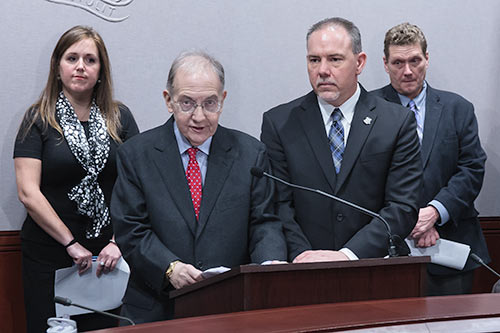Connecticut’s Retirement Security Savings Program in Danger
Sen. President Pro Tempore Looney, Sen. Majority Leader Duff, Speaker Aresimowicz and House Majority Leader Ritter Denounce Congressional Republicans’ Plan to Block Connecticut Program

Democratic leaders of the Connecticut General Assembly stood united today to denounce proposals by Trump-era Congressional Republicans who are seeking to roll back rules allowing states to create employee-sponsored, state-administered retirement plans.
On February 15, 2017, Congressional House Republicans voted 231-196 to pass House Joint Resolution 66, which negates the federal Department of Labor rule allowing states to establish savings programs for private-sector employees. The bill is now in the Senate.
The Congressional House Republican action comes despite strong support by Connecticut residents for a state-sponsored employee retirement savings program.
“Republicans in the United States Congress shouldn’t turn their backs on the more than 600,000 private-sector workers in Connecticut who don’t have an employee-sponsored retirement savings plan,” said Senate President Martin M. Looney (D-New Haven). “States like Connecticut, California, Oregon and Illinois are leading the way to ensure that private-sector workers have enough savings for their retirement. Republicans in Congress shouldn’t stand in the way of a financially secure future for hundreds of thousands of Connecticut residents.”
“Last year we passed landmark legislation to expand retirement security to the more than 600,000 private-sector workers in Connecticut who don’t have a retirement savings plan available through their employer,” said Speaker of the House Joe Aresimowicz. (D-Berlin). “It’s a travesty that the rollout of this plan—which is supported by small businesses, working families and seniors—is now being threatened by Republicans in Congress. Despite what happens at the federal level, we are committed here in Connecticut to ensuring that our hardworking residents are given the tools they need to save for the comfortable retirement they’ve earned.”
“It’s shocking, but not surprising, that Republicans in Congress would seek to put a halt to states addressing retirement security,” said Senate Majority Leader Bob Duff (D-Norwalk). “We can either help people save for retirement—with their own money now—or we can have taxpayers pick up the tab later. While Social Security has for many years prevented senior citizens from falling into poverty, it no longer provides a sustainable living for those with no other source of retirement income.”
“Hundreds of thousands of Connecticut residents don’t have access to an employer-based retirement plan. That’s exactly why Democrats in the legislature crafted a public retirement savings plan,” said House Majority Leader Matt Ritter (D-Hartford). “Now we need your voice to tell Republicans in Washington to keep their hands off Connecticut’s retirement.”
Last year, the General Assembly passed legislation (Public Act 16-29) creating a voluntary retirement savings program for the estimated 600,000 Connecticut residents who don’t have a retirement savings plan available to them through their employer. Connecticut’s plan is slated to begin in less than a year—in January 2018—and it will save 3 percent of workers’ pay after they’ve been with a company for 120 days.
The legislation creates a program in which employees make voluntary contributions to be deposited into a professionally managed retirement fund; every employee would have the chance to enroll in the retirement savings program. Employers wouldn’t have any fiduciary responsibility and wouldn’t be required to pay any administrative fees. The program is designed to be self-sustaining and low-risk.
Last year, the AARP shared the results of its report, A Common-Sense Approach: The 2016 Connecticut Work and Save Plan, a survey of 1,000 Connecticut residents ages 35-64 which was conducted by the AARP Public Policy Institute. According to the survey:
- 88 percent of Connecticut residents wish they had saved more for their retirement
- Regardless of political affiliation, 79 percent of Connecticut residents agree that elected officials should support a state retirement savings plan
- 65 percent of Connecticut residents are “anxious” about having enough money for retirement
- More than 90 percent of Connecticut residents say a retirement savings plan should be easy to use, low-cost, and should follow workers from job to job
The 2016 retirement security legislation was enacted two years after Sen. Looney and Rep. Aresimowicz led passage of a bill creating the Connecticut Retirement Security Board, which was tasked with conducting a market feasibility study and a comprehensive proposal for the creation of a retirement plan for private-sector Connecticut workers.
Share this page:
